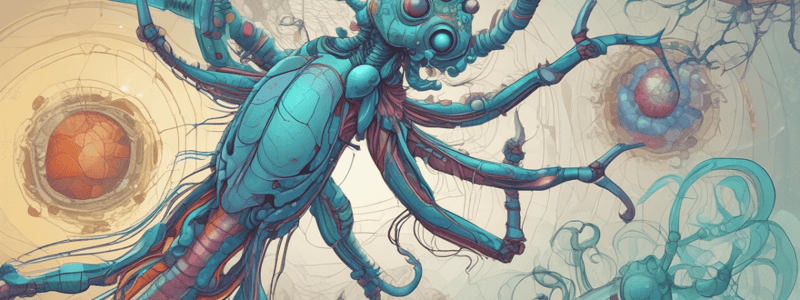Podcast
Questions and Answers
What is the main focus of the field of botany?
What is the main focus of the field of botany?
- The study of animals and their interactions with the environment
- The study of the interactions between organisms and their environment
- The study of microorganisms such as bacteria, viruses, and fungi
- The study of plants and their interactions with the environment (correct)
What is the primary function of carbohydrates in cells?
What is the primary function of carbohydrates in cells?
- To provide energy and structure for cells (correct)
- To generate energy for the cell through cellular respiration
- To provide structure and support for cells
- To store and transmit genetic information
What is the role of the mitochondria in cellular processes?
What is the role of the mitochondria in cellular processes?
- To synthesize proteins
- To regulate what enters and leaves the cell
- To generate energy for the cell through cellular respiration (correct)
- To store genetic information
What is the process by which cells generate energy from glucose?
What is the process by which cells generate energy from glucose?
What is the term for the physical and behavioral characteristics of an individual?
What is the term for the physical and behavioral characteristics of an individual?
What is the process by which plants convert light energy into chemical energy?
What is the process by which plants convert light energy into chemical energy?
What is the term for the study of how traits are passed down from generation to generation?
What is the term for the study of how traits are passed down from generation to generation?
What is the main function of the endoplasmic reticulum in cellular processes?
What is the main function of the endoplasmic reticulum in cellular processes?
Flashcards are hidden until you start studying
Study Notes
Branches of Biology
- Botany: study of plants and their interactions with the environment
- Zoology: study of animals and their interactions with the environment
- Microbiology: study of microorganisms such as bacteria, viruses, and fungi
- Ecology: study of the interactions between organisms and their environment
- Genetics: study of heredity, genes, and genetic variation
- Biochemistry: study of the chemical processes that occur within living organisms
- Molecular Biology: study of the structure and function of biological molecules such as DNA, RNA, and proteins
Biological Molecules
- Carbohydrates: provide energy and structure for cells
- Examples: sugars, starches, cellulose
- Proteins: perform a wide range of functions in cells
- Examples: enzymes, hormones, structural proteins
- Lipids: provide energy and structure for cells
- Examples: fats, oils, cholesterol
- Nucleic Acids: store and transmit genetic information
- Examples: DNA, RNA
Cell Structure and Function
- Cell Membrane: regulates what enters and leaves the cell
- Cytoplasm: jelly-like substance inside the cell membrane
- Nucleus: contains genetic material (DNA)
- Mitochondria: generate energy for the cell through cellular respiration
- Endoplasmic Reticulum: involved in protein synthesis and transport
- Ribosomes: site of protein synthesis
Cellular Processes
- Photosynthesis: process by which plants convert light energy into chemical energy
- Cellular Respiration: process by which cells generate energy from glucose
- Mitosis: process of cell division that results in two identical daughter cells
- Meiosis: process of cell division that results in four non-identical daughter cells
Evolution and Genetics
- Natural Selection: process by which individuals with favorable traits are more likely to survive and reproduce
- Genetic Variation: differences in the genetic code between individuals
- Genotype: the genetic code of an individual
- Phenotype: the physical and behavioral characteristics of an individual
- Mendelian Inheritance: the study of how traits are passed down from generation to generation
Branches of Biology
- Botany studies plants and their environmental interactions
- Zoology studies animals and their environmental interactions
- Microbiology studies microorganisms like bacteria, viruses, and fungi
- Ecology studies interactions between organisms and their environment
- Genetics studies heredity, genes, and genetic variation
- Biochemistry studies chemical processes in living organisms
- Molecular Biology studies biological molecules like DNA, RNA, and proteins
Biological Molecules
- Carbohydrates provide energy and structure for cells, with examples like sugars, starches, and cellulose
- Proteins perform various cell functions, including enzymes, hormones, and structural proteins
- Lipids provide energy and structure for cells, with examples like fats, oils, and cholesterol
- Nucleic Acids store and transmit genetic information, with examples like DNA and RNA
Cell Structure and Function
- The Cell Membrane regulates what enters and leaves the cell
- Cytoplasm is a jelly-like substance inside the cell membrane
- The Nucleus contains genetic material (DNA)
- Mitochondria generate energy for the cell through cellular respiration
- The Endoplasmic Reticulum is involved in protein synthesis and transport
- Ribosomes are the site of protein synthesis
Cellular Processes
- Photosynthesis is the process by which plants convert light energy into chemical energy
- Cellular Respiration is the process by which cells generate energy from glucose
- Mitosis is the process of cell division that results in two identical daughter cells
- Meiosis is the process of cell division that results in four non-identical daughter cells
Evolution and Genetics
- Natural Selection is the process by which individuals with favorable traits are more likely to survive and reproduce
- Genetic Variation refers to differences in the genetic code between individuals
- Genotype refers to the genetic code of an individual
- Phenotype refers to the physical and behavioral characteristics of an individual
- Mendelian Inheritance is the study of how traits are passed down from generation to generation
Studying That Suits You
Use AI to generate personalized quizzes and flashcards to suit your learning preferences.




